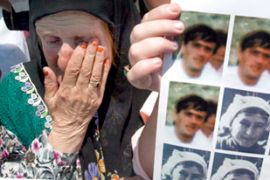Srebrenica buries more victims
Hopes raised after suspension of 35 policemen thought to be involved in atrocity.

Ratko Mladic, a Bosnian Serb army general, seized the former UN “safe zone” of Srebrenica in July 1995 and in the following days carried out what is considered Europe’s worst war crime since the second world war.
Elmana Mehic, a Srebrenican who came to bury the remains of her uncle, said: “God grant that what was done yesterday bears fruit. Twelve years have passed and nobody has done anything for us. They are only playing with us.”
Mehic’s uncle’s remains were collected from three different mass graves; she also lost her father, husband and many relatives in the massacre.
Several senior Bosnian Serb army officers have been sentenced by the UN war crimes tribunal in The Hague for the massacre, and others are bring tried in Bosnia.
Self-rule
However, top genocide suspects Mladic and his political boss Radovan Karadzic are still at large.
| Focus: first person |
The Dayton peace accords, which ended the 1992-95 war, split Bosnia into two parts, the Muslim-Croat federation and the Serb republic.
Srebrenica, 70 per cent Muslim before the war, went to the Serb republic. Muslims want self-rule for the town but the Serbs are opposed.
In his last act before handing over to Lajcak this month, Christian Schwarz-Schilling, a former peace envoy, issued a ruling that the memorial complex in Potocari near Srebrenica should be under the protection of the Bosnian state.
‘No return’
Srebrenica families welcomed the news, but complained that the same people who killed their relatives were still wearing the uniforms of the Bosnian Serb police and guarding the tombs of the victims.
But Mirnesa Sinanovic, 21, who came to bury the remains of her father, said: “Lajcak did a fair thing for us, the victims, because we deserved it after all these years.”
Sinanovic said her family had repaired their old house in a village near Srebrenica but were still not living there.
“Until we feel safe and secure, we will not return,” she said.
